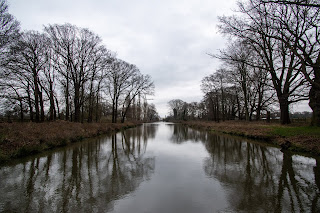Bushy Park Nature Diary - January
As this is the first entry on my blog, I thought I’d kick it
off by introducing you to my “Patch.” If you’re not familiar with the term it’s
usually used by birders to describe the local area that they frequent on a
regular basis and are most familiar with. In many ways I have a couple of
patches, but if I had to choose one it would have to be Bushy Park.
 |
| Looking towards the National Physical Laboratory - there's often a flock of black-headed gulls on here |
Bushy is one of the Royal Parks, situated in Zone 6 in the
Borough of Richmond on Thames, and it is a very special place indeed. I'm lucky enough to live a quick five minute walk from one of the gates but it’s easily accessible from Teddington, Kingston
and Hampton. It's the second biggest Royal Park at 445 hectares, and has a mix of habitats ranging from large stands of open
grassland to dense scrubby woodlands. Most of the park is a designated
SSSI because of the invertebrates lurking in the grasslands. Quite large areas are covered in ant-hills which is always slightly alarming when you
see children jumping around on top of them - the ants that make them bite!
With it being January, most of these invertebrates aren’t
around now, save the odd bee confused by how mild it’s
been lately. At the moment the park feels very barren – most of the trees are
denuded, the grass is very short and there is a lot of mud. With the rain we’ve had this winter the ground is saturated and there are
various paths that are impassable without wellies. Fortunately, being a Royal
Park, there are also plenty of surfaced paths to explore without getting your
feet muddy.
January really is the season for bird watching and not much else. I’ve already
seen flocks of redwing perching on the skeletal branches of blackthorn bushes
out in the middle of the park and the deer are usually followed by large flocks
of starling around now. The park keepers have been leaving out browse for them
to supplement what they can find growing in the park which makes it quite easy
to predict where to find them. All that grass is also good for small
rodents so the park supports a healthy kestrel population and I’ve noticed
quite a few of these perching in the taller oaks.
Probably my favourite walk in the park, although it is quite
muddy now, is along the Longford River in the Woodland Gardens. Dogs and bikes
aren’t allowed in the plantations, so its also quite a peaceful place and not a
lot of people know about it so it’s a wonderful place to spot woodland birds. Robins
and blue and great tits are a certainty, but I often find myself surrounded by
long-tailed tits hopping in and out of the trees and bushes. They flit so fast
it can be hard to see them properly, but their tails give them away. Whenever I
see tit flocks I always look carefully because they often have a guest star amongst them;
goldcrests in particular like the safety of the group and I’ve already spotted
the little darting shape of our smallest bird in amongst the larger tits.
 |
| Long-tailed tit |
 |
| Goldcrest - cute faces, and they really don't stay still for long! |
 |
| Robin - common feature just about everywhere |
The
woodlands are also a great place to go to spot treecreepers and nuthatches, often
on the same tree, and neither of which are particularly common in London. The
little blue nuthatch, with its stream-lined body, crawls up the trunk while the
brown treecreeper, its hooked beak a key feature, scuttles down it (And both usually go behind it if you’re trying to take a picture). Sadly this month I’ve
been unable to spot kingfishers along here but it’s always worth keeping an eye
out for the characteristic flash of blue or to listen for their high-pitched
call.
I’m looking forward to the Spring because, frankly, I hate
the dark and cold, but there’s still plenty to appreciate in this dead winter
season, even in an urban park.




Lovely stuff Paul. We were there ourselves today, and had a very enjoyable time. Two beautiful herons, a little egret and a sparrow hawk seen amongst plenty more.
ReplyDeleteI shall keep an eye out for more entries. Thanks.
Thank you! There's always something to see out in Bushy Park - we're incredibly lucky to live so close to it. I'll be putting out some more entries too - some astronomy material as well as wildlife!
Delete